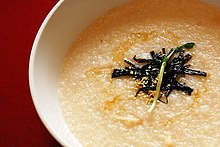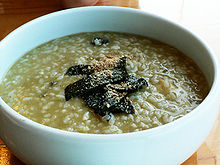Jeonbok-juk
| Jeonbok-juk | |
 Jeonbokjuk made without the abalone's internal organs | |
| Korean name | |
|---|---|
| Hangul | 전복죽 |
| Hanja | |
| Revised Romanization | jeonbok juk |
| McCune–Reischauer | chŏnpok chuk |
Jeonbokjuk (Korean pronunciation: [tɕʌnbok̚tɕ͈uk]) is a variety of juk (죽), or Korean porridge, made with abalone and white rice. Abalone is regarded as a high quality ingredient in Korean cuisine and was often presented as a gift to the king of Korea.[1]The dish is a local specialty of Jeju Island where abalones are commonly harvested. Jeonbokjuk is known as not only a delicacy but also as a nutritional supplement and digestive aid, especially for ill patients or elderly people.[1][2]Jeonbokjuk can be made with or without the abalone's internal organs. The former type of jeonbokjuk has a green tinge while the latter is more ivory in color.[3]
Preparation and serving
Abalones are first prepared by cleaning with a brush in water, and the flesh is taken out from the flat and middle of the shells with a small kitchen knife. The internal organs are removed separately from the flesh (taking care not to damage them). The flesh is slightly parboiled in a pot of boiling water and then thinly sliced. Rice is soaked in a bowl of water 3 to 4 hours before cooking. The abalone flesh is stir-fried on a pot over a mid-flame with sesame oil, with the soaked rice added shortly after. After stir frying for a while, water is poured into the pot and the dish is cooked at a higher temperature. Constant stirring prevents the ingredients from sticking to the bottom of the pot. After the dish has come to a boil, the heat is lowered and let to simmer. The dish is seasoned with salt or ganjang (Korean soy sauce).[4]

See also
References
- ^ a b "Jeonbokjuk (Rice porridge with abalone)". The Jeju-do government's official website / EncyKorea. Retrieved 2008-05-31.
- ^ Template:Ko Jeonbokjuk at Encyclopedia of Korean Culture
- ^ Template:Ko Jeonbokjuk, the color of Jeju's sea, Jeju Sori, 2009-02-19. Retrieved 2010-07-02.
- ^ Template:Ko Jeonbokjuk at Doosan Encyclopedia
- "Korean cuisine" (PDF). Jeonbokjuk (Abalone Porridge). Korea Tourism Organization. pp. p.20.
{{cite web}}:|pages=has extra text (help)
